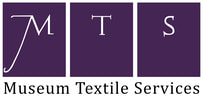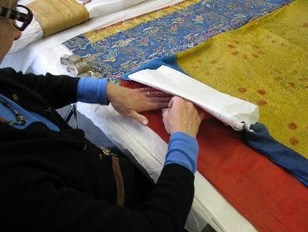|
Andover, Mass. – Museum Textile Services will turn over the last of 18 Tibetan thangkas to the Mead Art Museum at Amherst College next month. The thangkas – cloth paintings depicting Buddhist deities and symbols, sewn into fine silk textiles – were the focus of a two-year conservation project. Picturing Enlightenment: Thangkas in the Mead Art Museum at Amherst College will open August 26, 2011. This will be the first time the thangkas have been seen by the public since 1953. To protect these fragile objects from the potentially damaging effects of light, the collection will be displayed in two parts. The first group of 10 thangkas will be on view from August 26, 2011 to January 1, 2012. To accommodate the careful exchange of the works, the exhibit will close briefly and the remaining eight thangkas will be displayed from January 20 to June 3, 2012. Camille Breeze, Director of Museum Textile Services was thrilled to work with the staff at the Mead Art Museum. “In April 2009 Collections Manager Stephen Fisher called us to survey the collection of thangkas. As a part of that process, we examined each piece, took extensive photographs and recorded measurements, construction details and current condition. The thangkas had been in archival storage for several years and were extremely fragile. When Elizabeth Barker, Director and Chief Curator, discovered the thangka collection, she really wanted to make them accessible – first through an exhibition and then later for study.” A few months later, the thangkas made their way to Museum Textile Services, where they were gently cleaned, the painted surfaces stabilized and the silk supports reinforced. “We cleaned the thangkas with a gentle hand vacuum and vulcanized rubber sponges that absorb and remove a lot of the dirt and grime that accumulates over time. The thangkas were covered in an oily residue, which is probably from the traditional yak butter lamps used in Tibetan culture,” said Camille. “We took a lot of time reinforcing the silk supports to ensure that the thangkas would not be damaged when they are exhibited this fall.” This August, the last of the thangkas will be returned to the Mead Art Museum. "We have really enjoyed learning about the thangkas and Tibetan Buddhism," said Camille. "From a conservation perspective, this project had a lot of exciting challenges. Thangkas consist of two distinct components - the painting and the textile boarder - that are conserved in two very different ways. It allowed our team to draw upon all of our skills as conservators." About Tibetan Thangkas Thangkas function as objects of Buddhist meditation. They are also used as teaching aids and serve as a visual recording of history. Each thangka has a central painting surrounded by a fabric mount, usually made of Chinese silk. This fabric can become damaged over time from rolling, moisture, light exposure and the weight of the hanging thangka. Many thangkas have a silk veil that hangs over the image and can be raised and held in place by a silk cord for viewing. The images depict Buddha, bodhisattvas, other deities or eminent monks. The deliberately conservative artistic styles and iconographic forms used by painters of thangkas have changed little over the course of this thousand-year tradition. During the painting process, the artist performs specific rights. At its completion, a consecration ceremony called the "opening of the eyes" ensures that the resulting image is an accurate reflection of the deity depicted. Most of the thangkas in the Mead's collection were commissioned for a single monastery in Lhasa, Tibet. Religious leaders specified the paintings' subjects and the completed thangkas were displayed in groups, sometimes numbering more than one hundred in a single room. About the Mead Art Museum
The Mead Art Museum houses the art collection of Amherst College, totaling more than 16,000 works. An accredited member of the American Association of Museums, the Mead participates in Museums10, a regional cultural collaboration. During the academic term, the museum is open Tuesday through Thursday and Sunday from 9 a.m. to midnight and from 9 a.m. to 5 p.m. Friday and Saturday. For more information, including a complete schedule of events, all free and open to the public, please visit the museum’s website. About Museum Textile Services Museum Textile Services, the premier textile conservation studio in New England, specializes in the preservation of fabric-based materials for cultural institutions and individuals. Museum Textile Services documents, cleans, stabilizes and mounts historic textiles. Through educational programs and outreach initiatives, Museum Textile Services teaches individuals and cultural heritage institutions how to ensure better preservation of their textiles. Accompanying Image A high resolution copy of the image included above can be downloaded here.
33 Comments
|
Press Contact
Camille Breeze Categories
All
Subscribe to RSS Feed
|


 RSS Feed
RSS Feed